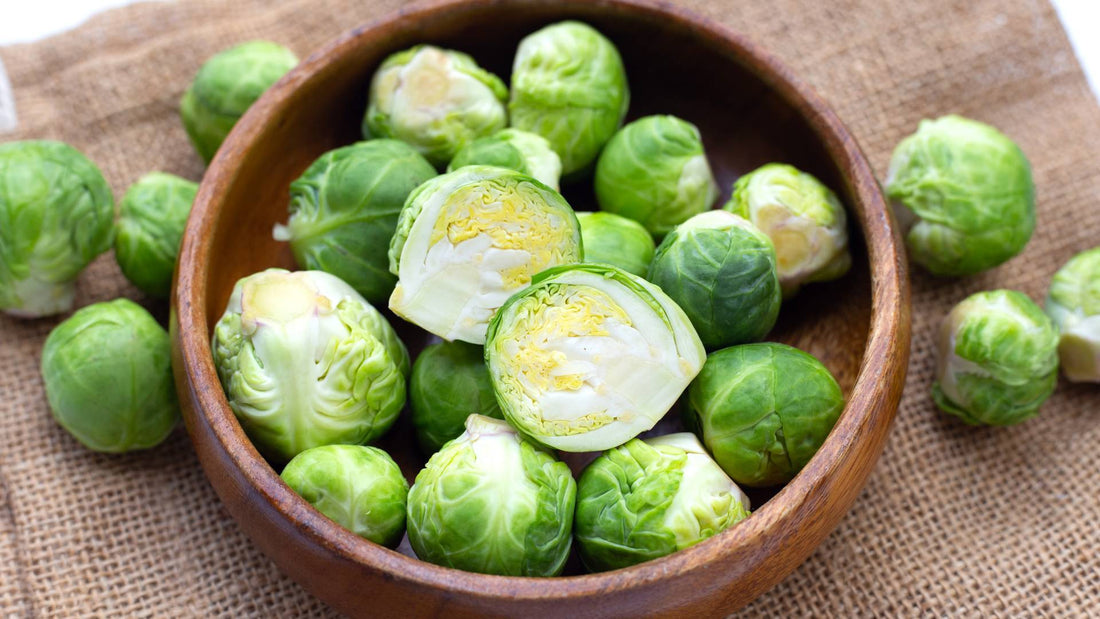
Can Dogs Eat Brussel Sprouts?
Yes, dogs can safely consume Brussel sprouts. These leafy greens are non-toxic and nutritious for our furry friends. Brussel sprouts are part of the cruciferous vegetable family, which are a group of vegetables known for their cross-shaped (crucifer) flowers, and they are part of the Brassicaceae family. and they offer various health benefits.
Cruciferous vegetables are known for their nutritional value, including being good sources of vitamins, minerals, and antioxidants. They are also associated with potential health benefits, such as reducing the risk of chronic diseases like cancer and heart disease.
Table of Contents
- Are Brussel sprouts good for dogs?
- Can dogs eat raw Brussel sprouts?
- Can dogs eat cooked Brussel sprouts?
- How many Brussel sprouts can dogs eat?
- How often can dogs eat Brussel sprouts?
- What are alternative safe natural treats for dogs?
Are Brussel sprouts good for dogs?
Yes, Brussel sprouts are good for dogs when fed in moderation and prepared correctly. They offer several nutritional benefits. Brussel sprouts are a good source of vitamins, including vitamin K, vitamin C, and vitamin A. They also contain essential minerals like potassium and folate. Additionally, they provide dietary fibre, which can aid in digestion and support overall gut health in dogs.
Can dogs eat raw Brussel sprouts?
No. It's generally not recommended to feed dogs raw Brussel sprouts. While Brussel sprouts are non-toxic to dogs, raw ones can be difficult for them to digest and may lead to gastrointestinal discomfort. Dogs have a shorter digestive tract compared to humans, which can make it challenging for them to break down certain raw vegetables.
Raw Brussel sprouts may also contain compounds that can be difficult for dogs to digest, potentially leading to gas, bloating, or even stomach upset.
Can dogs eat cooked Brussel sprouts?
Yes, dogs can eat cooked Brussel sprouts, and they are generally safe for them when prepared and served in moderation. Cooking Brussel sprouts makes them easier for dogs to digest compared to raw ones, which can be tough on their digestive system.
Here are some important points to keep in mind when feeding cooked Brussel sprouts to your dog:
- Thorough Cooking: Ensure that the Brussel sprouts are cooked thoroughly. Steaming or boiling is a good method as it softens the sprouts and makes them more palatable and digestible for dogs.
- Plain Preparation: Serve cooked Brussel sprouts plain and without any seasonings, sauces, or additives. Seasonings and sauces may contain ingredients that could be harmful to dogs.
- Size: Cut Brussel sprouts into smaller, bite-sized pieces to reduce the risk of choking, especially for smaller dog breeds.
How many Brussel sprouts can dogs eat?
The number of Brussel sprouts that a dog can safely eat depends on the size and breed of the dog, as well as their individual tolerance and digestive sensitivity. While Brussel sprouts are generally considered safe for dogs when cooked and served in moderation, it's essential to exercise caution and not overfeed them.
As a general guideline, you can start by offering a small amount of cooked Brussel sprouts to your dog, such as one or two sprouts, and monitor their response. If your dog has never had Brussel sprouts before, it's a good idea to introduce them gradually to see how their digestive system reacts.
Keep in mind the following factors:
Size of the Dog: Smaller dogs should consume fewer Brussel sprouts than larger dogs. Adjust the portion size accordingly.
Individual Sensitivity: Some dogs may have individual sensitivities to certain foods, including Brussel sprouts. Watch for any signs of digestive discomfort or allergies, such as diarrhoea, gas, or upset stomach.
How often can dogs eat Brussel sprouts?
Brussel sprouts should be considered a special treat rather than a staple in your dog's diet. Offering them once in a while, such as a few times a month, is generally a safe frequency.
What are alternative safe natural treats for dogs?
Natural treats are often single protein, air dried, chews for dogs. When referring to a natural treat, it generally means minimal processing and the lack of additional additives or flavourings. There are many natural treats on the market with options for all ages and sizes of dog.
Achilles Tendon
Achilles Tendon dog chews offer several benefits. These natural treats are not only delicious and enjoyable for dogs but also serve as a source of high-quality protein (usually beef). They are low in fat and can help support dental health by encouraging chewing, which aids in plaque and tartar removal. Additionally, Achilles tendon chews are a long-lasting option, keeping dogs engaged and satisfied while providing a satisfying chew that can help relieve stress and anxiety. Their natural composition makes them a safe and nutritious choice for dogs, making them an excellent addition to a balanced canine diet.
Beef Tripe
Dried Beef tripe is rich in protein and provides a healthy source of amino acids, which are crucial for muscle development and overall well-being. Furthermore, the texture and act of chewing on tripe chews can promote dental health by reducing plaque and tartar buildup. These chews are also easily digestible and gentle on a dog's stomach, making them an excellent choice for sensitive tummies.
For any further help and advice please contact us on 01484 246420 and why not join our social media channels and online community on Instagram, Facebook or YouTube.
With Wags and Woofs,
Laura, Dolly & Reggie




